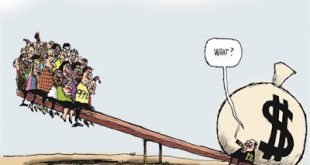Javier Milei will be Argentina’s next president. Milei is an extreme right-wing populist, with authoritarian, some may say Fascistic, tendencies. He is an admirer of Trump and Bolsonaro. He is rumored to talk with his deceased dog, that he had cloned. His party’s proposals range from the dangerous – like dollarization, the closing of the Central Bank, the drastic reduction of social spending, the loosening gun ownership laws, and the criminalization of abortions – to the insane – like...
Read More »Crypto’s Weimar
A cryptocurrency has just re-enacted the Weimar hyperinflation.Yesterday, the price of the cryptocurrency TITAN crashed to zero, and its related stablecoin IRON fell off its USD peg, trading as low as 69 cents to the dollar. It was a sudden and dramatic collapse that left investors shocked and bewildered. Equally shocked and confused, the coins' issuer launched an immediate investigation: Iron Finance issued its post mortem a few hours later. This is the key paragraph:Later, at around 3pm...
Read More »Calculus for Economists
Gabriel Sterne complains about economists' loose use of mathematical terminology: Of course, it's not just economists who use "increase" and "accelerate" interchangeably. But economics is a mathematical discipline, and in mathematics, "increase" and "accelerate" mean different things. So is Gabriel's observation true, and if it is, is it a problem?To test Gabriel's hypothesis, I ran a little Twitter test. I asked this question: This was of course far from rigorous: the sample was...
Read More »Modern Money Theory (MMT) in the Tropics
Paper has been published as a PERI Working Paper.From the abstract: Functional finance is only one of the elements of Modern Money Theory (MMT). Chartal money, endogenous money and an Employer of Last Resort Program (ELR) or Job Guarantee (JG) are often the other elements. We are here interested fundamentally with the functional finance aspects which are central for any discussion of fiscal policy and have received more attention recently. We discuss both the limitations of functional...
Read More »Inflation Is Always And Everywhere A Political Phenomenon
We don't understand inflation. Those who lived through the high inflation of the 1970s are convinced that inflation is always and everywhere caused by wage-price spirals. Germans, economic Austrians and Bitcoiners are convinced that inflation is always and everywhere caused by central bank money printing. Small-state supporters are convinced that inflation is always and everywhere caused by profligate governments borrowing and spending excessively. Hard money enthusiasts are convinced that...
Read More »Galbraith on MMT and the Hyperinflation Boogeyman
From his recent piece: "Does this mean that 'deficits don’t matter'? I know of no MMT adherent who has made such a claim. MMT acknowledges that policy can be too expansionary and push past resource constraints, causing inflation and exchange-rate depreciation – which may or may not be desirable. (Hyperinflation, on the other hand, is a bogeyman, which some MMT critics deploy as a scare tactic.)"Also, this: "And MMT is not about Congress ordering the Fed to use its “balance sheet as a cash...
Read More »Brian Romanchuk — A MMT View On The Theory Of Hyperinflations
Now that MMT is in the news big time, it's high time to repost a link to Brian's post on MMT and hyperinflation.Bond EconomicsA MMT View On The Theory Of HyperinflationsBrian Romanchuk
Read More »Timothy Taylor — 58 Episodes of Hyperinflation (Venezuela is #23)
For the record.Conversable Economist58 Episodes of Hyperinflation (Venezuela is #23)Timothy Taylor | Managing editor of the Journal of Economic Perspectives, based at Macalester College in St. Paul, Minnesota
Read More »Tcherneva, Sawicky and Kaboub on MMT and policy
Pavlina Tcherneva: There is nothing more crippling to a bold policy agenda than the myth that the government can run out of money. This myth is behind every But how will you pay for it? objection to proposals such as a Green New Deal and Medicare for All. New House Majority Leader Nancy Pelosi (D-Calif.) has even proposed instituting self-defeating PAYGO (pay as you go) rules, which would require all new government spending to be matched with increased revenue, wrongly prioritizing the...
Read More »Hyperinflation and inequality
I'm still reading The Great Leveler: Violence and the History of Inequality from the Stone Age to the Twenty-First Century, which is fun, well-written and in my view less controversial than what most reviews have suggested. Yes, inequality tends to fall mostly by violent means during periods of crisis. Note, also, that Walter Scheidel uses in this book the concept of surplus, and as noted earlier here (or here and here) before is part of this broader group of social scientists that still...
Read More » Heterodox
Heterodox






